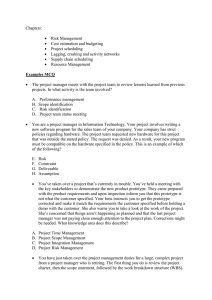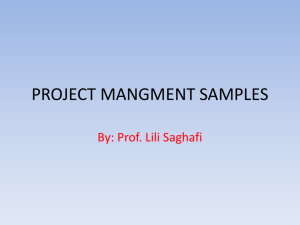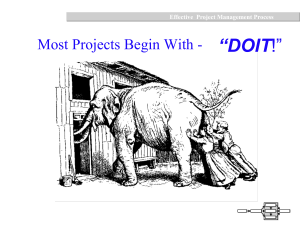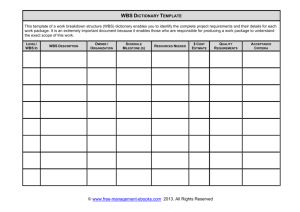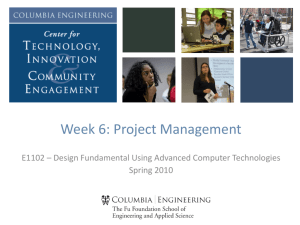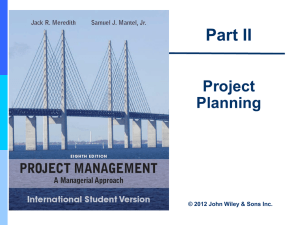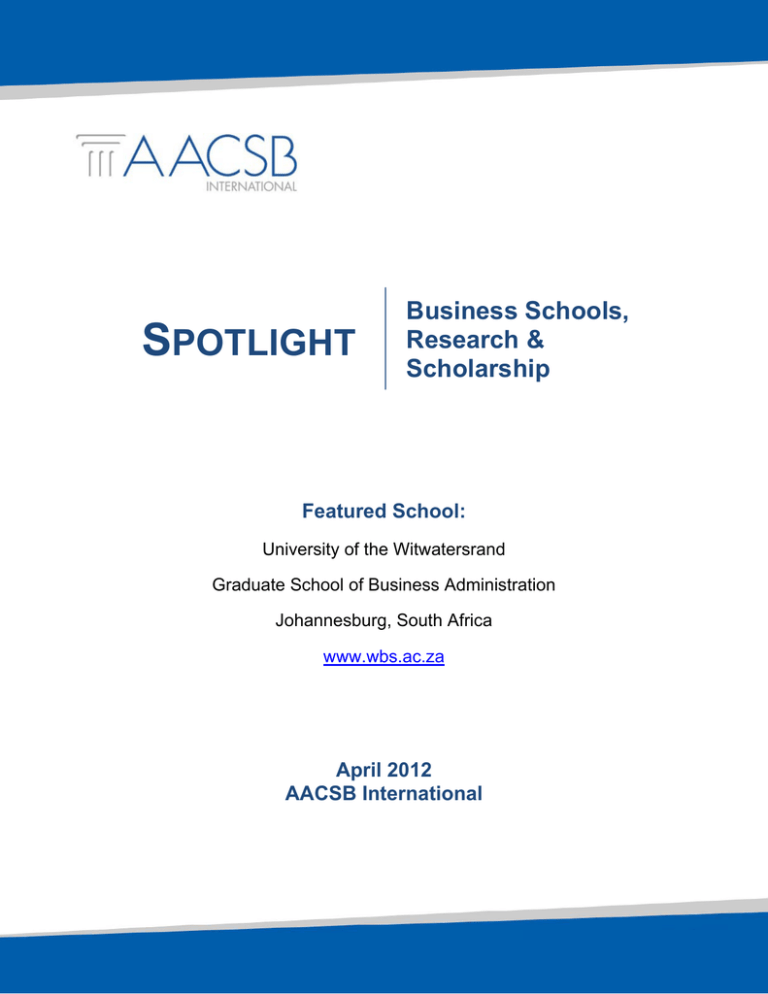
SPOTLIGHT
Business Schools,
Research &
Scholarship
Featured School:
University of the Witwatersrand
Graduate School of Business Administration
Johannesburg, South Africa
www.wbs.ac.za
April 2012
AACSB International
SPOTLIGHT | Business Schools & Research/Scholarship
University of the Witwatersrand | 2
Wits Business School Case Centre
At South Africa’s University of the Witwatersrand, the Graduate School of Business Administration (also
known as the Wits Business School or WBS) has used the case method as an effective pedagogical tool
for many years. However, as is true in many emerging economies, the cases available for use throughout
much of WBS’ history have primarily been international in nature, drawing on case research that is not
generally applicable to the national context in which the school is situated. In 1993, Professor Mike Ward,
then-Head of WBS, pushed for the creation of a formalized case writing process to develop case research
specific to the unique business environment of South Africa. Wits Business School is now the only
business school in that country to host a research center specifically devoted to growing and developing
the available store of South Africa-focused case studies, the WBS Case Centre.1
According to Claire Beswick, the Centre’s coordinator and head case writer, the initial motivation for this
was twofold. Firstly, she says, WBS students are better able to relate to cases about firms in South Africa
than they are to ones in Europe or the U.S., because they are more familiar with the business context in
which the firms operate. Thus there was a clear need for a greater volume of South African cases.
Secondly, before the WBS Case Centre was established, there was no incentive for academic faculty
members at WBS to get engaged in case development, as most of them leaned more heavily toward their
teaching responsibilities and research aimed at publication in academic journals.
As a consequence, the decision was made to hire a number of professional case writers to work with
WBS faculty to develop cases focused on South African firms. One of the first such case writers was
Courtenay Sprague, a Harvard Business School-trained case writer brought on board at the Centre’s
founding, who now serves on the WBS faculty as an associate professor of human resource management
and as director of the WBS Case Centre.2 Ms. Beswick herself has worked at the Centre since 2001.
The Structure of the WBS Case Centre
Staffing levels at the WBS Case Centre have varied over the years, according to Ms. Beswick. The
current staffing model, which she describes as both “functional and economical,” includes one full-time
and one part-time case writer, as well as about four freelance writers, although in the past the Centre has
employed as many as three full-time and seven part-time staffers at once. In choosing both freelancers
and full-time case writers, she says, the Centre looks for excellence in writing ability above all else. While
they prefer candidates with master’s or honours bachelor’s degrees, as indicators of intellectual ability
and interest in working in an academic environment, what is most important is the ability to present the
case in the certain way that case writing necessitates.
© AACSB International. All Rights Reserved.
SPOTLIGHT | Business Schools & Research/Scholarship
University of the Witwatersrand | 3
Case writing is “a specific kind of writing, and its requirements are not immediately obvious,” Ms. Beswick
says. “A case is supposed to look like a story, but there is far more below the surface:
You have to write to illustrate the teaching objectives, but what is to be taught has to be
hidden in the story and not made explicit. The writer's opinion must not be evident;
This is research writing (although not academic writing) and therefore requires a level of
attention to detail and rigour that a lot of other writing does not;
At the same time, as it is not academic writing, the writer has to be able to write like a
journalist, in a very accessible way…”3
A case writer need not necessarily have studied business to work at (or for) the Centre. In fact, Ms.
Beswick says, sometimes prior expertise in business or a sub-field can be disadvantageous, “because
you don't question assumptions and you don't think to ask the stupid question” that helps the students
using the cases in class understand what the case is being used to teach.
The case writers at the Centre always team up with a member of the faculty for academic support while in
the process of writing a case. There is no formal process for such pairings, according to Ms. Beswick,
although case writers that have demonstrated particular flair or ability in certain subject areas will often be
steered toward cases that fit their preferences and skills. It is the faculty member of the case writing team,
however, who is expected to provide the subject matter expertise.
Ms. Beswick says that approximately one-half to two-thirds of WBS’ faculty members have historically
engaged in becoming part of a case writing team. Interestingly, she notes that it is the part-time faculty
members, particularly those that are employed by or run businesses of their own, that are often the most
engaged in the case development process at the Centre. Faculty are also incentivized to work as part of a
case writing team via WBS’ faculty workload model, which grants them workload points for being part of a
team, and producing the teaching notes for the resulting cases.
Funding for the WBS Case Centre comes primarily through the business school, particularly from revenue
generated by the executive education programs, and also from the university itself. Ms. Beswick says that
the resources made available to the Centre are significant, in no small part because the demand for the
Centre’s services always outstrips the time available to the staff case writers. The cases are considered a
highly valuable resource to the business school, and the majority of WBS’ faculty use them in their
classes.
As a general rule, however, one potential revenue stream that the Case Centre deliberately avoids is
being paid by the firms themselves, as this might call into question the objectivity of the research.
Besides, contract cases for industry are more time- and resource-intensive to produce, and tend to be
more useful as documentative records than as teaching cases, according to Ms. Beswick. Thus, they
require significant interest on the part of WBS in order to justify the expenditure of human resources.
© AACSB International. All Rights Reserved.
SPOTLIGHT | Business Schools & Research/Scholarship
University of the Witwatersrand | 4
The Writing Process
Faculty members themselves often come to the case writers with ideas for cases they can use in their
classes, but the case writers sometimes receive pitches from local companies as well, or come up with
potential cases themselves through observation. Ms. Beswick says that this ensures the case writing
process is both demand-driven and idea-driven. Once a potential case study firm has been decided upon,
the case writer meets with the faculty member that will work with them on the writing team to determine
the goals for the case, and generate a preliminary outline.
According to Ms. Beswick, outlining objectives for the case up front in this way is a critical part of the case
writing process. It is important, she says, to set the academic objectives of the case (i.e., what the faculty
intend for it to teach the students) ahead of time. In that way, the time and resources required to produce
a case study are wisely and usefully spent.
If the firm to be studied has not already become part of the planning process at this point, the writing team
checks their willingness to participate before continuing. Assuming the firm is willing to become the
subject of a case study, the writing team will then interview appropriate personnel, and the case writer
brings the resulting data back to the Centre to begin the actual writing of the case study. Ms. Beswick
ensures the work is rigorously edited for style, grammar, etc., before sending it to the faculty side of the
writing team for their input. Once that input is incorporated, the writing team will return to the company
and show them the result for approval and any final edits, prior to publishing the case.
This writing process can become very time-consuming. Though the WBS Case Centre has generated
more than 160 cases over its life thus far,4 the writing staff have averaged about 15 cases per year over
the past 10 years, according to Ms. Beswick (and sometimes less when, on occasion, communications
break down between writing teams and the firms they research).
The Impact of the WBS Case Centre
The WBS Case Centre makes its cases available for order from its own website, but the cases they
produce have several other outlet channels as well. The European Case Clearing House (ecch) makes all
the cases that the WBS Case Centre has produced available for purchase on its website. Four of the
WBS cases have won ecch’s best-selling case prize (one of them twice over), in 2002, 2009, 2010, and
2011.5 Additionally, Emerald Group Publishing, Ltd. has selected several of the WBS Case Centre’s
cases for publication in their Emerging Markets Case Studies Collection.6 Ms. Beswick notes that this is of
© AACSB International. All Rights Reserved.
SPOTLIGHT | Business Schools & Research/Scholarship
University of the Witwatersrand | 5
particular interest for those faculty members who are primarily interested in the research aspect of case
writing at the WBS Case Centre, because they still get publishing credit, as well as the workload points.
Ms. Beswick says that it is a point of particular pride for the Centre that most of its cases have been
accepted by these institutions without any need for changes. The WBS Case Centre has successfully
produced high-quality South African case studies, such that they are in use by business schools all over
the world. This fact speaks to the global need for more case research that is focused on emerging
markets such as South Africa, a need that the WBS Case Centre is well-positioned to continue meeting.
Acknowledgements: AACSB International is grateful for the assistance of Claire Beswick, Head Case
Writer and Coordinator of the WBS Case Centre.
© AACSB International. All Rights Reserved.
SPOTLIGHT | Business Schools & Research/Scholarship
University of the Witwatersrand | 6
End Notes
1
University of the Witwatersrand, Wits Business School. (2011) The WBS Case Centre web page. Electronic document, http://www.wbs.ac.za/speciality_courses/case_centre/, accessed February 24, 2012. 2
University of the Witwatersrand, Wits Business School. (2011) Lecturing Staff: Courtenay Sprague web page. Electronic document, http://www.wbs.ac.za/faculty/lecturing_staff/hr‐management/996760.htm, accessed February 29, 2012. 3
Beswick, Claire. (2012) Personal communication, March 13, 2012. 4
Wits Business School Case Centre. (2011) Collected Case Study Abstracts, 4/19/2011. Electronic document, http://www.wbs.ac.za/download_files/case_centre/Case_Abstracts_Overview.pdf, accessed February 28, 2012. 5
ecch. (2012) ecch Product Lookup Search Results. Electronic document, http://www.ecch.com/educators/search/results?s=CFB6EDFFD6B562188D03178FB236F3DF, accessed March 1, 2012. 6
Emerald Group Publishing, Ltd. (2012) About the Emerging Markets Case Studies Collection web page. Electronic document, http://www.emeraldinsight.com/products/case_studies/, accessed March 1, 2012. © AACSB International. All Rights Reserved.

